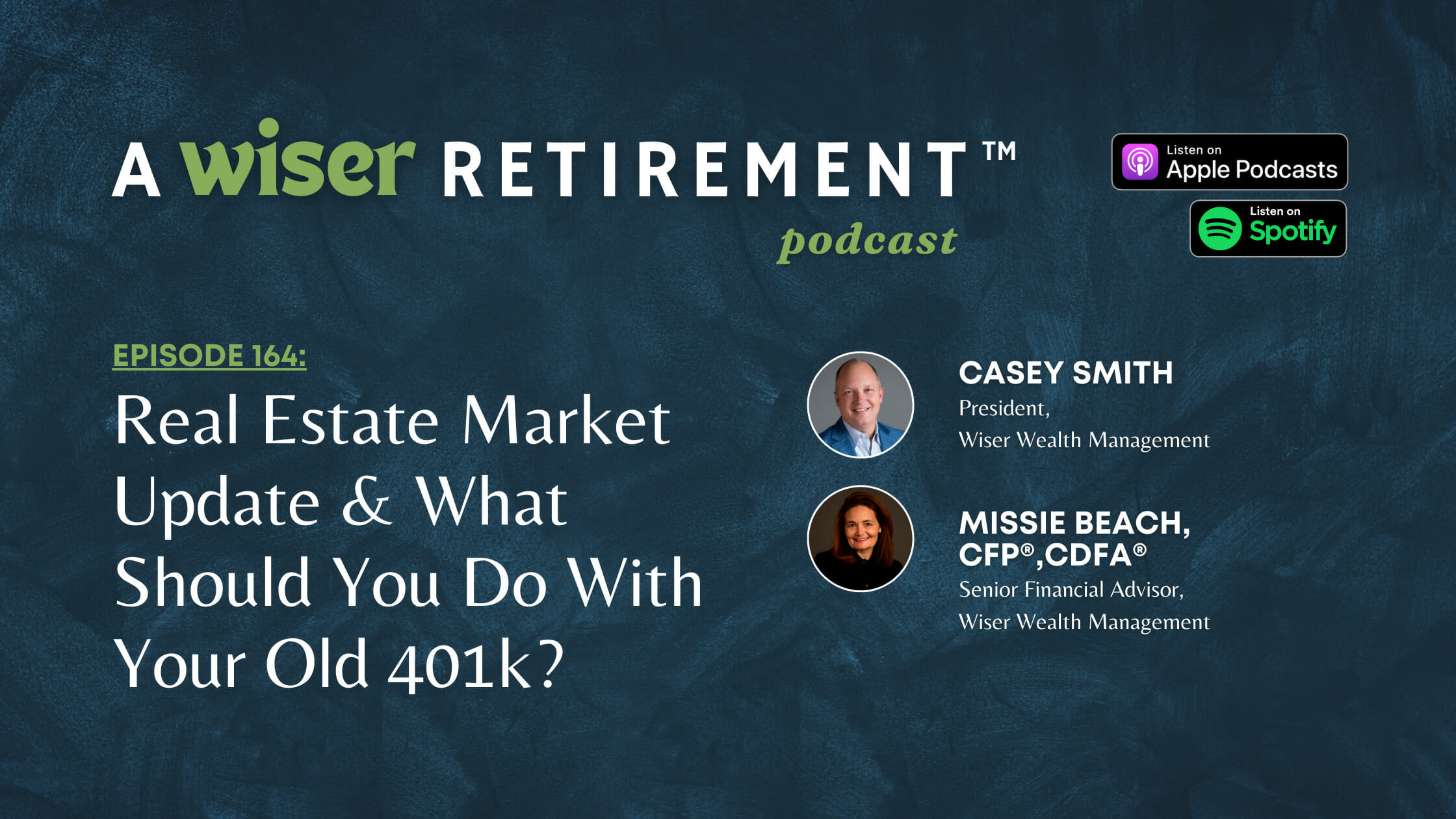
Real Estate Market Update & What Should You Do With Your Old 401k?
On this episode of A Wiser Retirement™ Podcast, Casey Smith opens the podcast with guest Tom Townsend, real estate agent at Townsend Realty Group. They briefly talk about what’s going on in the current real estate market. For the remainder of the episode, Casey is joined by Missie Beach, CFP®, CDFA® to talk about what you should do with your old 401k.
Listen on Apple Podcasts or watch on YouTube:
SUMMARY:
May 2023 Real Estate Market Update
The metro Atlanta area is doing great economically. The employment pace is good and incomes are up compared to 2022. Mortgage rates nationwide are still high. Even though the high rates definitely hurt the market, the real estate market is still very active. Volume-wise, we are about 30% down compared to 2022. However, we have to consider that the last 2 years were completely outside of the norm, so if we compared it to 2019, the volume would be up. Home values are holding steady because both the supply and the demand curves have shifted down almost equally. This is what has prevented home prices from collapsing. If you are looking to buy or sell a house in 2023, it is essential to have a good real estate agent on your side to help you navigate through this unusual market situation.
There is a lot of misinformation out there, and it is spread with the intent of causing fear and uncertainty. Though these are unusual times in the real estate market, we have been able to see an optimistic response, as opposed to what many expected from the housing market in 2023.
What should you do with your old 401k?
There are more old 401k’s out there than one would realize. It’s ideal to have all of your 401k accounts organized and under the same account. In most cases, if you leave your 401k with your old employer, you will have a limited selection of investments. It’s also possible that your old employer might start charging you an administrative fee since you are not a current employee. Leaving your 401k at the old employer is an option, but in most cases, it’s not the best option.
If you have a 401k loan, you must consider that before resigning or leaving the company. You might want to reach out to the company’s 401k administration so you can try to understand your options and their implications.
A good example of when it makes sense to keep the money where it is is when you have a government TSP (Thrift Savings Plan). When clients come to us with a Legacy Thrift Savings plan, we know that’s a case where it doesn’t make sense to roll it into an IRA, since the fees on these accounts are so low.
What if you have employer stock in your 401k?
Net unrealized appreciation (NUA) comes into play with the employer stock portion of your 401k. If you have one of those plans, and have built up a large allocation of your employer’s stock, what you can do when you leave your employer is roll out the rest of the assets to an IRA. Then, the company stock portion you would roll out to a taxable brokerage account. Yes, you will pay income tax on the employer stock portion, but only on the basis of that.
Therefore, if you don’t have an ultra-low-cost 401K, and are concerned about administrative issues, it’s easier to manage money if it’s in one place. If that’s not your case, and you don’t have employer stock, neither do you have an employer loan, then we recommend to roll it out of your old employer. Account consolidating is usually a safe, easy and wise way to keep your accounts organized. This allows you more visibility into your assets. In this case it also makes it easier to consider new 401(a), or 401k plan, and make sure that you have good investment options in it.
Download our eBook on “Buyer Beware: Why do they keep trying to sell you that annuity?”
TIMESTAMPS:
0:00 Intro
0:35 Real Estate Market Update
15:30 What to do with your old 401k?
17:37 What if you have employer stock in your 401k?
LINKS:
Learn more about Casey Smith and Missie Beach, CFP®, CDFA®
CONNECT:
Twitter, Instagram, Facebook, LinkedIn, and YouTube.
Learn more about A Wiser Retirement™ podcast and access previous episodes.
Share This Story, Choose Your Platform!
Wiser Wealth Management, Inc (“Wiser Wealth”) is a registered investment adviser with the U.S. Securities and Exchange Commission (SEC). As a registered investment adviser, Wiser Wealth and its employees are subject to various rules, filings, and requirements. You can visit the SEC’s website here to obtain further information on our firm or investment adviser’s registration.
Wiser Wealth’s website provides general information regarding our business along with access to additional investment related information, various financial calculators, and external / third party links. Material presented on this website is believed to be from reliable sources and is meant for informational purposes only. Wiser Wealth does not endorse or accept responsibility for the content of any third-party website and is not affiliated with any third-party website or social media page. Wiser Wealth does not expressly or implicitly adopt or endorse any of the expressions, opinions or content posted by third party websites or on social media pages. While Wiser Wealth uses reasonable efforts to obtain information from sources it believes to be reliable, we make no representation that the information or opinions contained in our publications are accurate, reliable, or complete.
To the extent that you utilize any financial calculators or links in our website, you acknowledge and understand that the information provided to you should not be construed as personal investment advice from Wiser Wealth or any of its investment professionals. Advice provided by Wiser Wealth is given only within the context of our contractual agreement with the client. Wiser Wealth does not offer legal, accounting or tax advice. Consult your own attorney, accountant, and other professionals for these services.





